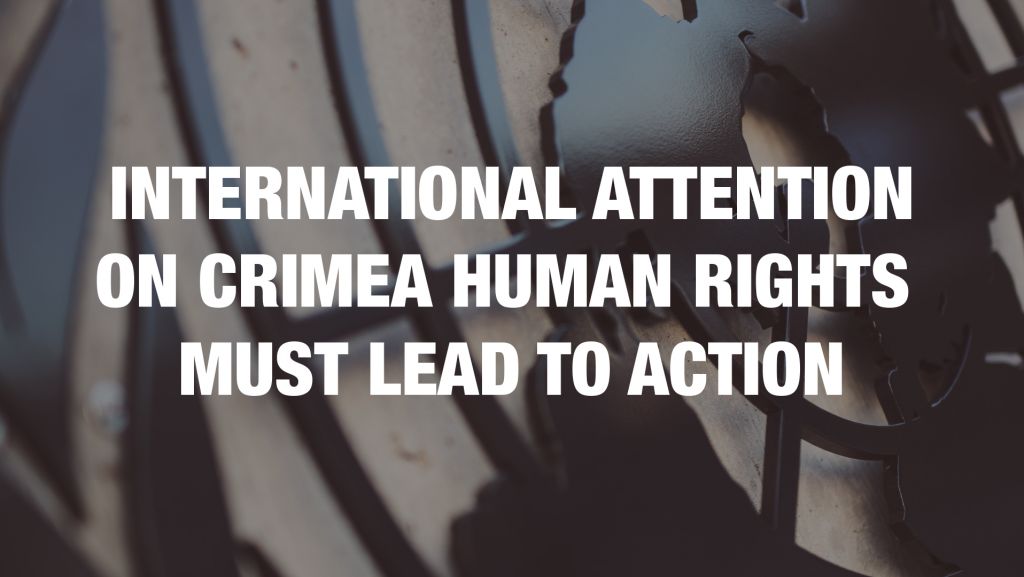HRHF draws attention to the politically motivated arrests of journalists, human rights defenders, minorities, and others, and to the clearing of Crimea of what, in the eyes of the de facto authorities, are undesired people.
Emir-Usein Kuku, a Crimean Tatar human rights defender, was arrested in February 2016 on charges of terrorism and placed in detention. His family faces threats, harassment, and intimidation. Mykola Semena, a Crimean Tatar journalist working for Radio Free Europe / Radio Liberty RFE/RL, faces charges of “separatism” for undermining Russia’s territorial integrity.
At the Human Rights Council in September, HRHF stressed the deteriorating human rights situation in Crimea and called for international scrutiny, and it underlined the distressing human rights situation in its November briefing note to the General Assembly, in which it urged the international community to call for an end to impunity for human rights violations.
The Office of the UN High Commissioner for Human Rights recently published its report on the human rights situation in Ukraine, and on 12 December, the Human Rights Council discussed this in Geneva. Further, recent deliberations on Crimea at the UN General Assembly in New York will culminate this week in a vote on a resolution on Crimea.
Florian Irminger, Head of Advocacy at HRHF, commented: “The human rights situation in Crimea is receiving the international attention it so badly needs, but this attention must lead to action, and ultimately allow for the de facto authorities in Crimea and their supporters to be held accountable. Unfortunately, the General Assembly did not go the whole way in its resolution, which fails to address directly the authorities in Crimea and fails to hold Ukraine to its obligations and commitments.”
As reported by the UN Mission, the de facto authorities have ignored and swept aside fair trial rights, lawful arrest and detentions, freedom of movement, and rights of detainees, and they have pursued a crackdown against civil society and the media, including impunity for hate speech, breaches of the right to legal defence and the presumption of innocence, and illegal forced transfer of the population from Crimea to the Russian Federation.
HRHF delivered the following statement to the Human Rights Council on 12 December. It is endorsed by Crimean Human Rights Group, Human Rights Information Centre (Ukraine), and Ukrainian Helsinki Human Rights Union:
HRHF calls on:
- The de facto authorities in Crimea to immediately cease all forms of harassment and persecution of journalists and human rights defenders, and to allow peaceful dissent, especially the expression of minority or pro-Ukrainian views.
- The international community to further scrutinise the human rights situation and support the work of the Office of the High Commissioner for Human Rights, and to ensure that the de facto authorities in Crimea are made aware that the international community will hold them and their supporters accountable.
- The Ukrainian government to facilitate legal access to Crimea for journalists, lawyers, and human rights defenders, and support internally displaced people (IDPs) in Ukraine and condemn attempts to stigmatise them, as was reported by the UN Mission.
Documents:
- HRHF Statement at HRC on Crimea 12.12.16
HRHF delivered the statement to the Human Rights Council on 12 December. It is endorsed by Crimean Human Rights Group, Human Rights Information Centre (Ukraine), and Ukrainian Helsinki Human Rights Union
- Crimea: Distressing Human Rights Situation in Need of International Attention
In this November 2016 briefing note, HRHF and its Ukrainian partners call on the UN General Assembly to address the human rights situation in Crimea, and underline the systemic human rights abuses as a consequence of Russia’s occupation.
- The Peninsula of Fear
Chronicle of occupation and violation of human rights in Crimea
More on Crimea
Draft UN General Assembly resolution on Crimea, 31 October 2016.
Crimea: Distressing Human Rights Situation Needs International Attention
Deteriorating human rights in “Russianised” Crimea needs international scrutiny





